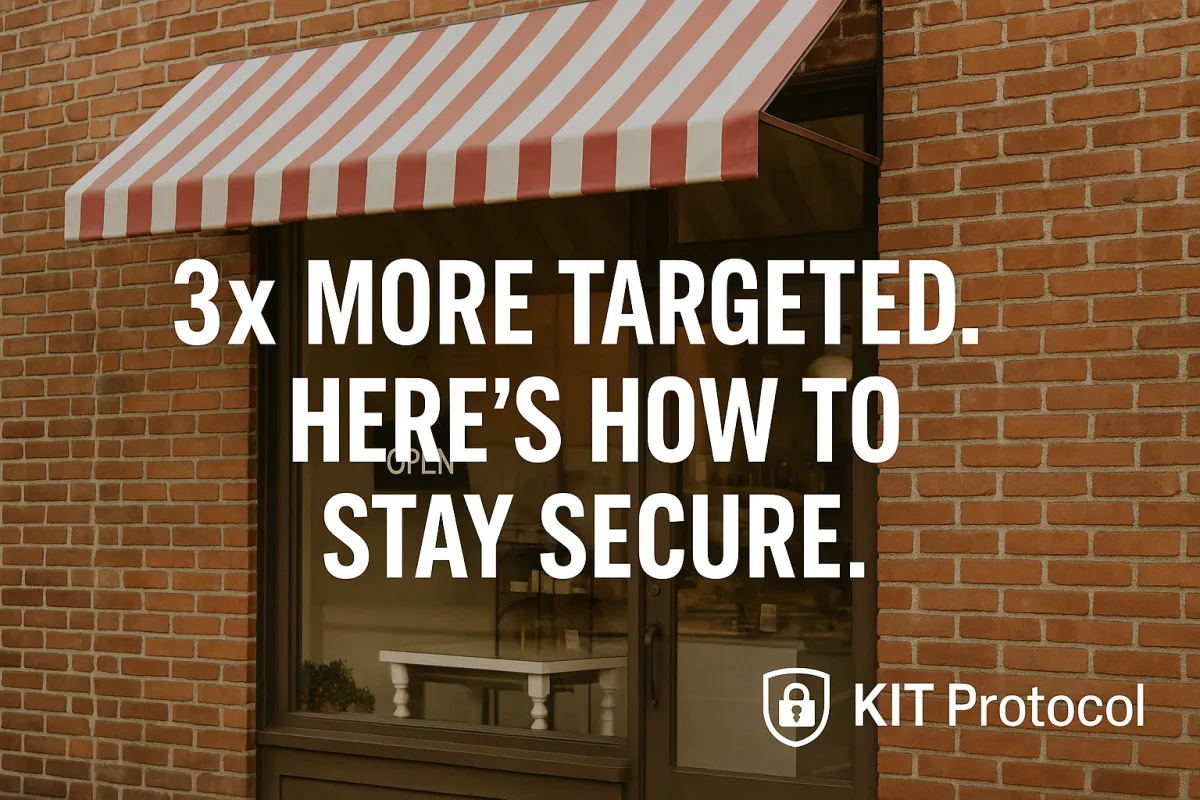
The Small Business Cyber Wake-Up Call
Last month, a local bakery lost 3 months of customer orders to ransomware. Here's what every Main Street business needs to know.

Sarah's bakery had been the heart of downtown for fifteen years. Wedding cakes, birthday celebrations, morning coffee runs—her little shop was woven into the fabric of the community. Then, on a quiet Tuesday morning, everything changed.
Sarah arrived to find her computer screen displaying a chilling message: "Your files have been encrypted. Pay $15,000 in Bitcoin within 72 hours, or lose everything forever."
Three months of custom cake orders. Gone. Customer contact information. Gone. Supplier contracts, employee schedules, accounting records—all locked behind a digital wall that might as well have been built from solid steel.
Sarah's story isn't unique. In fact, it's becoming the new normal for small businesses across America.
The Uncomfortable Truth About Small Business Cybersecurity

Here's what keeps cybersecurity experts awake at night: small businesses are now three times more likely to be targeted by cybercriminals than large corporations.
Why? The math is brutally simple.
Large companies have cybersecurity teams, million-dollar security budgets, and layers of protection that make them expensive targets to crack. Small businesses? They often have the same valuable data—customer information, financial records, business plans—but with a fraction of the protection.
To cybercriminals, small businesses are like houses in nice neighborhoods with no alarm systems and unlocked doors. The reward is high, the risk is low, and the effort required is minimal.
"But We're Too Small to Be Targeted"
This is the most dangerous myth in small business today.
The reality is that modern cyber attacks are largely automated. Criminals aren't sitting in dark rooms specifically choosing your business. They're launching software that scans thousands of businesses simultaneously, looking for vulnerabilities.
Your bakery, law firm, HVAC company, or accounting practice isn't flying under the radar—you're showing up on their radar precisely because you're small.
The Real Cost Goes Beyond Money

When Sarah's bakery was hit, the $15,000 ransom demand was just the beginning. Here's what really happened over the following months:
Week 1: Lost productivity as employees couldn't access any systems Week 2: Emergency IT costs to rebuild systems from scratch
Month 1: Lost customers who couldn't reach them or get their orders Month 2: Insurance battles (spoiler alert: cyber coverage wasn't included) Month 3: Legal fees for customer notification requirements Ongoing: Damaged reputation and lost community trust
The total cost? Over $75,000. For a local bakery, that's not just a setback—it's potentially business-ending.
Why Traditional "Solutions" Fall Short
Most small businesses approach cybersecurity like they're shopping for insurance—they want the cheapest option that checks the box. But cybersecurity isn't insurance; it's infrastructure.
Antivirus software alone stops about 30% of modern attacks. That's like wearing a seatbelt but driving without brakes.
"We backup to the cloud" often means syncing files, not creating true backups. When ransomware encrypts your files, that encryption gets synced too.
"Our employees are smart" misses the point entirely. The most successful attacks target smart people with sophisticated tricks that would fool anyone.
Introducing the KIT Framework: A Better Way Forward
At Red Door Technologies, we've developed a different approach. Instead of trying to sell you more software, we focus on building what we call the KIT Protocol—a simple framework that actually works for real businesses.
KIT stands for Keep, Inspect, Trust:
KEEP: Maintain What Matters
Keep your software updated automatically
Keep your data backed up and tested regularly
Keep your team trained on current threats
INSPECT: Watch for Warning Signs
Inspect emails before clicking links or attachments
Inspect user permissions and access regularly
Inspect your network for unusual activity
TRUST: Verify Before Acting
Trust, but verify financial requests through secondary channels
Trust your instincts when something feels wrong
Trust proven security tools, not quick fixes
This isn't about becoming a cybersecurity expert. It's about building simple, sustainable habits that protect your business without disrupting how you work.
What Sarah Wishes She'd Known
Six months after the attack, Sarah's bakery is back in business. But the recovery process taught her lessons that every small business owner needs to hear:
"I thought cybersecurity was too expensive. Turns out, not having it was ten times more expensive."
"I assumed my computer guy had it covered. I never asked the right questions about what 'covered' actually meant."
"I wish someone had explained it in plain English instead of throwing technical terms at me. It's really not that complicated once you understand what you're protecting and why."
The KIT Advantage: Enterprise Protection, Small Business Reality
Here's what makes the KIT approach different from everything else you've been told about cybersecurity:
✓ No tech jargon – Everything is explained in business terms you actually understand
✓ No scary tactics – We focus on practical protection, not fear-mongering
✓ No budget shock – Enterprise-grade security designed for small business budgets
✓ No disruption – Protection that works with your business, not against it
Your Cyber Wake-Up Call Doesn't Have to Be an Attack
Sarah's story ended with recovery, but it didn't have to start with disaster. Every day you wait to address cybersecurity is another day you're leaving your business, your employees, and your customers vulnerable.
The good news? You don't need to become a cybersecurity expert overnight. You just need to make one smart decision: partner with someone who understands both cybersecurity and small business.
Take Action Today
Don't wait for your wake-up call to come in the form of a ransom note.
Your next step is simple: Get a clear picture of where your business stands today. Our Cyber Risk Assessment takes 15 minutes and gives you a roadmap for protection that fits your business and budget.
During your assessment, we'll:
Identify your biggest vulnerabilities without any technical overwhelm
Show you exactly how the KIT Protocol applies to your specific business
Give you a clear, jargon-free plan for moving from vulnerable to protected
This isn't a sales pitch—it's a business necessity.
Every day, businesses just like yours are making the choice between proactive protection and reactive recovery. Sarah's bakery is proof that reactive is always more expensive.
Ready to protect what you've built?
Schedule your free Cyber Risk Assessment today. Because the best time to install a smoke detector isn't after the house is on fire.
Red Door Technologies specializes in making enterprise-grade cybersecurity simple and affordable for Main Street businesses. Our KIT Protocol has protected hundreds of small businesses from cyber threats without breaking their budgets or disrupting their operations.
